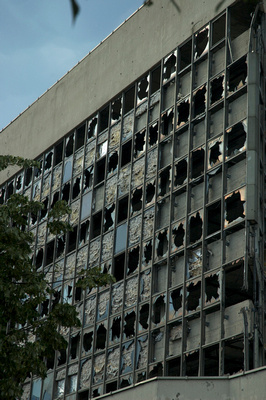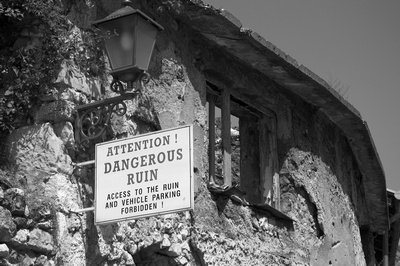 Mostar, the city with the famous Stari Most bridge over the Neretva river. But it still is very damaged by the war. The people are divided, buildings are unsafe,...
Mostar, the city with the famous Stari Most bridge over the Neretva river. But it still is very damaged by the war. The people are divided, buildings are unsafe,...
The events in Kiev touch me on a different level then other similar events… This does not justify any other dictatorship in the world and it also does not deny the suffering of other people. I am as shocked by the events in the Central African Republic as many others. Thousands have been butchered, those who are fleeing have to be protected. And those who are angry are this for a reason. It is, as so often, a tragedy with two sides. But nothing can justify the religious cleansing that happened there in the past weeks. It is total dehumanisation… It is fair to say that 15% of the population of the Central African Republic has been killed, disappeared or is fleeing.
And lets not forget Venezuela, a country breaking down politically and economically. If the violence there isn’t quickly replaced by dialogue we might have, once again, a bitter civil war in Central America. You can read more on Venezuelay in this latest report from the Crisisgroup. They warned for this over a year ago!
And still in all honesty, Kiev, the Maidan square, gives me a different feeling. This is in our backyard… It is in Europe the continent I live in. I like to see Europe as a rich ensemble of regions with their own identities. An incredible richness, even in the regions that are having financially hard times, thanks to their identity. We have an enormous amount of freedom. We can speak up, we can discuss, we can engage into politics, we are free. We have a voice. I can write this text and shouldn’t be worried about consequences for myself, my family, my job,…
We live in a democracy. And it is a stable democracy. Who can even imagine that a war would rage in our country (Belgium)? Just try, you’ll quickly think ‘that is not possible, that will not happen,…’ That is how stability, safety,… feels in day to day life. You get used to it.We clearly have forgotten that all this is not to be taken for granted. My grandparents and many others, have fought for their lives, for their freedom, for democracy in the second World War. And it is after this war that European countries unite to make sure this will not happen again… Let me rephrase that: our grand parents fought for our freedom and democracy.
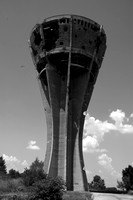 Vukovar, a city where 264 people were killed on two days in November in in 1991.
Vukovar, a city where 264 people were killed on two days in November in in 1991.
But only twenty years ago it was proven how vulnerable this stability can be. In the Balkan region, the former Yougoslavia, European citizens had again to fight for freedom, for survival, for democracy. The city of Sarajevo was sieged for over three years. It was the longest enclosure of a city since Sint-Petersburg in the second World War. The only way in or out was a little tunnel (wide enough for just one person, not high enough to stand up) under the airfield. You can still visit this tunnel if you go to Sarajevo.
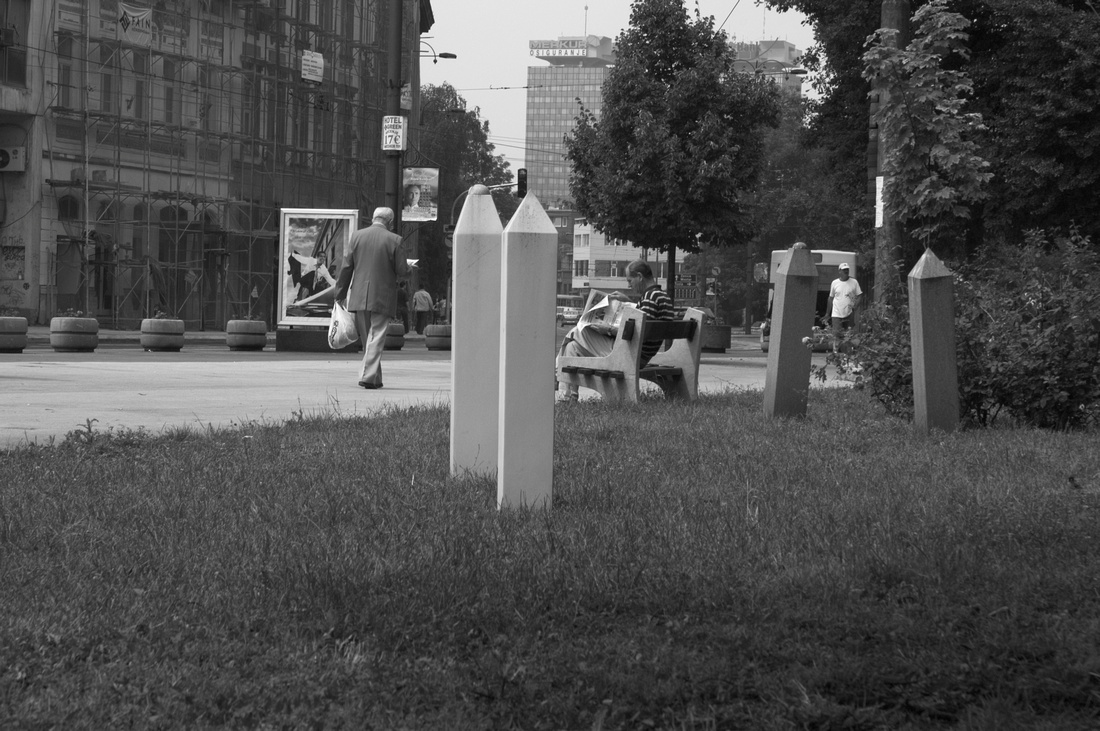 Sarajevo would shoot random people on the streets. It became impossible to go to the graveyards to burry the dead. People ended up digging graves in the city parks.
Sarajevo would shoot random people on the streets. It became impossible to go to the graveyards to burry the dead. People ended up digging graves in the city parks.
Sarajevo survived the longest siege since WWII, from 1992 till 1996. She survived as a city and is one of the most amazing multicultural places to go to.
The people of Sarajevo stood strong, all together. And they survived the siege as a multi cultural city. But not without paying a high price. Snipers shot civilians in sniper alley, people died of starvation or undercooling in the harsh winters. Dead people had to be buried in the city parks. The snipers would even shot at people that were paying their respects to the lost ones. And even helping a wounded turned out to be just a tactic by the sniper to then be able to kill more. Total dehumanisation. Madness, just 20 years ago, a good 10 hours ride from where I live, Belgium. During that war the village of Srebrenica was witness of the biggest massacre since the second World War. It happened under our eyes: 8000 men are killed in three days. That is over 2500 per day, over 100 per hour, more than 1 per minute… And that for three days, day and night. Madness...
The war in former Yougoslavia came very close for me when I travelled around the current countries that were part of Yougoslavia before the war in 2006? It was not the idea to follow the story of the war on this road trip, but it seemed unavoidable. If you venture just a little bit off the beaten track you can’t get around it. And it is an experience that you carry with you. Walking through the city of Mostar. Seeing the buildings that are shot in to pieces, realizing that there were thousands of people trapped in this city during this war. The same goes for Vukovar, Sarajevo,… But also Belgrade and the Serbian people suffered their losses. It is a wakening experience to see a building that was destroyed by a ‘precision’ bombardment. On all sides there are horrific experiences.
When we drove through Kosovo at some point we realized we did not see one older / original house. Every house was a brand new or even not finished. It is the scar of a campaign that burned down every single house in every single village in complete valleys. It is a silencing experience. And at that time you had still KFOR-troops around to secure the fragile stability.
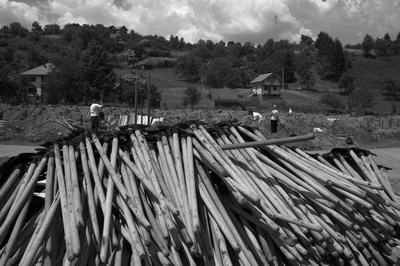 Srebrenica. It is the single biggest massacre in Europe since WWII. And it happened in our backyard, not more then 10 hours of driving from Brussels.
Srebrenica. It is the single biggest massacre in Europe since WWII. And it happened in our backyard, not more then 10 hours of driving from Brussels.
We arrived on July the 10th. Unknowing that the yearly memorial day was one day later.
It made a huge impression on me and I believe it is one of the places every European should go to. It is our very recent history and it is a horrible one.
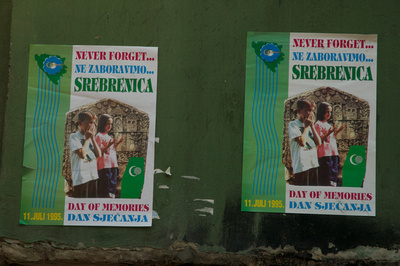 Srebrenica. It is the single biggest massacre in Europe since WWII. And it happened in our backyard, not more then 10 hours of driving from Brussels.
Srebrenica. It is the single biggest massacre in Europe since WWII. And it happened in our backyard, not more then 10 hours of driving from Brussels.
We arrived on July the 10th. Unknowing that the yearly memorial day was one day later.
It made a huge impression on me and I believe it is one of the places every European should go to. It is our very recent history and it is a horrible one.
But it really hit home when we arrived at Srebrenica on July the 10th. Not knowing that the day after (July the 11th) is the remembrance day. Piles and piles of shuffles ready for use. For many hundreds women who lost their husband, son, father,… this is the day they can finally burry their loved one. Once a body is identified the family can say its prayers and find rest with the burial of their father, son, brother,… It are intense moments when they find the grave of their loved ones. And the shear number is impossible to capture with one’s humane consciousness. Still today not every family has been able to find rest, not every body has been identified.
It looks that today, friday the 21st of February, there is a opportunity to get back to the negociations instead of the fights in Ukraine. There is hope, but it won’t be easy. The past days I was afraid. I kept thinking… not again, not again,… Ukraine has never been closer to a civil war then the past days. We the rest of the world, can’t do much on the terrain. But we can be a witness. These days it is almost impossible to say ‘I didn’t know’, let alone to state ‘how could I have known’. It is in our backyard. You hop in your car from Belgium early morning an the same evening you would be in a war zone… We can not have this happening, not again. So speak up, realise (or at least try to) what war would really mean to our European neighbours. It isn’t about the fighting, it is hard un-imageable suffering of innocent people like you and me.
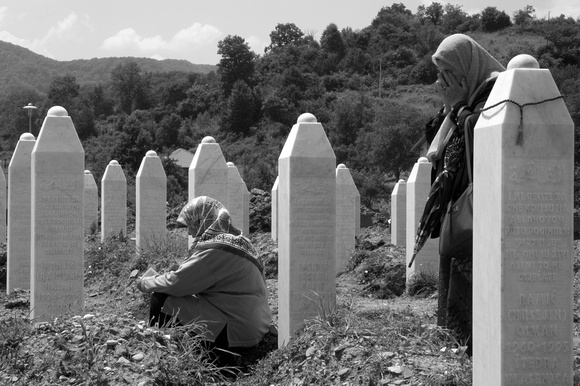 Srebrenica. It is the single biggest massacre in Europe since WWII. And it happened in our backyard, not more then 10 hours of driving from Brussels.
Srebrenica. It is the single biggest massacre in Europe since WWII. And it happened in our backyard, not more then 10 hours of driving from Brussels.
We arrived on July the 10th. Unknowing that the yearly memorial day was one day later.
It made a huge impression on me and I believe it is one of the places every European should go to. It is our very recent history and it is a horrible one.
This one is for Ukraine. But sadly, as mentioned earlier, it is not a single case. The same is to be said for the Central African Republic, Venezuela, Thailand,… and so many other places in the world where democracy is in danger or has not yet been installed.
We have the fortune to live in a stable and safe democracy, use the advantages of this to help others. Be a valuable witness, follow reliable sources on social media and share information. Speak up about situations. Give the people who are hurting in this world a voice. Stay human as a witness and care.
Take care, stay safe,
Pieter.
